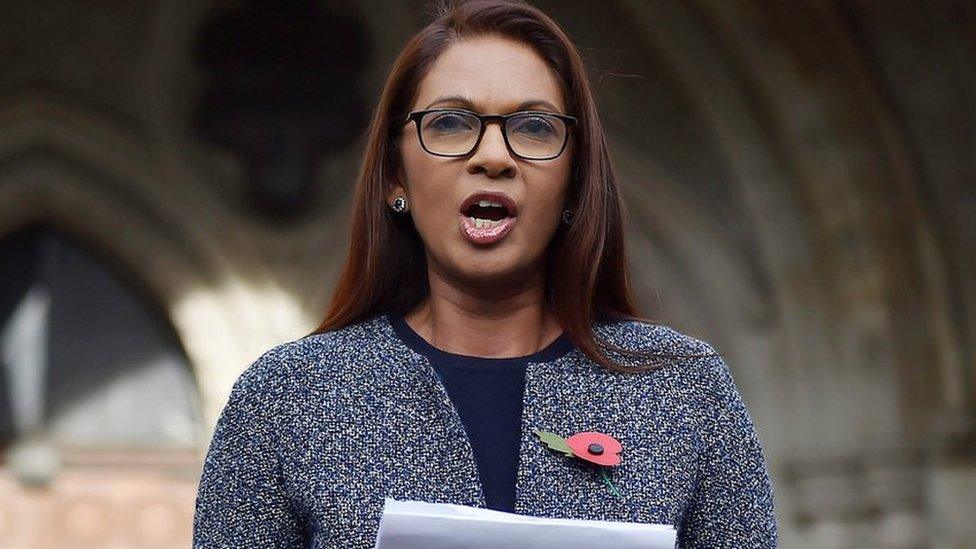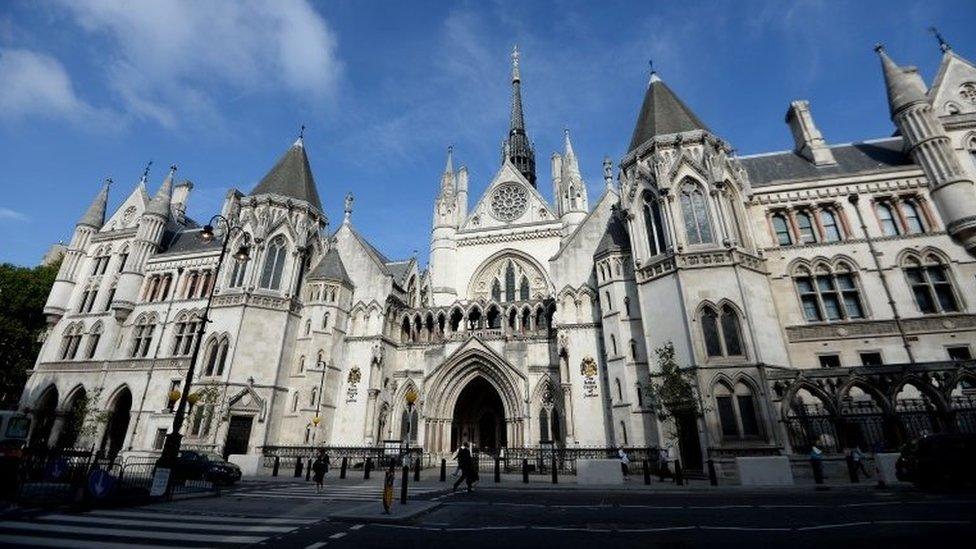Brexit: Campaigner Gina Miller threatens no deal court battle
- Published

Businesswoman Gina Miller brought the Brexit legal case
Anti-Brexit campaigner Gina Miller says she will take the government to court if the next PM tries to shut down Parliament to push through no deal.
Ms Miller, who won a legal battle against ministers over Article 50, said the step would be "an abuse" of powers.
She told Sky News she wanted to "defend Parliamentary sovereignty", not stop Brexit.
Brexiteer MP Priti Patel said it was "not acceptable" to use the courts to try to tie the hands of MPs.
Most MPs are against leaving the EU without a deal and could try to stop it from happening.
Shutting down - or proroguing - Parliament could potentially provide a way for a prime minister to force through a no-deal Brexit against MPs' wishes.
With Parliament not sitting, MPs would not be able to block it - for example, by holding a vote of no confidence in the prime minister.
Boris Johnson, Conservative leadership candidate and favourite to win the race to be prime minister, has vowed to leave the EU by the current deadline of 31 October with or without a deal.
He has refused to rule out proroguing Parliament in order to achieve that - his rival, Jeremy Hunt, has insisted he would not take that step.
In a no-deal scenario, the UK would leave the EU with no agreement about the "divorce" process, immediately exiting the single market and customs union - arrangements designed to facilitate trade.
Opponents of no deal say it would damage the economy and lead to border posts between Northern Ireland and the Republic of Ireland, but politicians in favour of no deal insist disruption could be quickly overcome.
What does proroguing Parliament mean?
Former Conservative prime minister Sir John Major told the BBC this week he would seek a judicial review in the courts if the new prime minister tried to suspend Parliament, describing such a move as "utterly and totally unacceptable".
Now Ms Miller and her legal team have sent a letter to Mr Johnson warning him about their plans for legal action too.
She told Sky: "I have never been a fan of Brexit… but that is completely separate, completely different, from defending the central pillar of our constitution."
She said it would be an abuse of power for a PM "through desperation" to "try to limit the voice of the MPs we all elect".
"We think that it's beyond the prime minister's powers because parliamentary sovereignty is actually the jewel in the constitutional crown."
No deal 'leverage'
Ms Patel, a supporter of Mr Johnson, told Sky: "I'm not surprised [at Ms Miller's remarks] because there seems to be a relentless movement to delay Brexit, to stop Brexit happening… to question the integrity of a future government in its renewed determination to exit the European Union".
She said the process of leaving must be "down to Parliament, not third parties going through the courts".
Work and Pensions Secretary Amber Rudd has previously warned strongly against no deal, but told the BBC's Andrew Marr on Sunday she accepted "we now need to allow no deal to be part of the leverage to make sure that people compromise more".
"I would hope that the EU will compromise and that [Tory Brexiteer group] the ERG will compromise too," she said.
Ms Rudd - who backs Mr Hunt for the leadership - said she was still concerned about the economic impact of no deal, but added: "I am no longer saying that I will lie down in front of the bulldozers if it arrives."

What is a judicial review and can it stop a no-deal Brexit?
By Danny Shaw, BBC home affairs correspondent

The process of judicial review is a tried and trusted legal procedure which helps hold policy-makers to account, but it can last a long time - usually months.
In judicial review cases, it's not the court's job to rule on whether the decision made by the public organisation is correct or not. Instead, it is concerned about the way in which the decision or action has been taken: have the right procedures been followed? Has the public body exceeded its powers?
And is that decision or action "irrational" - in other words, so unreasonable that no sensible person could have arrived at it?
Only the Queen can decide to suspend Parliament, but it's highly unlikely there would be a legal challenge against any decision Her Majesty made. Instead, any judicial review would probably revolve around the legality of the advice to suspend Parliament offered to the Queen by the new prime minister.

Meanwhile, Chancellor Philip Hammond has warned the UK will not be able to control key elements of a no-deal Brexit.
He told BBC Panorama the EU would control many of the "levers" - including what happens to the flow of goods through the port of Calais in France.
"The French can dial that up or dial it down, just the same as the Spanish for years have dialled up or dialled down the length of the queues at the border going into Gibraltar," he said.
The Treasury has spent £4.2bn on Brexit preparations, but Mr Hammond has warned that, even with careful planning, a no-deal exit could cost the country up to £90bn.
French officials have previously rejected suggestions they could resort to a "go-slow" policy at Calais if there is no Brexit deal - insisting that closing the port would be "economic suicide".

Do you have any questions about what would happen in the event of a no-deal Brexit?
Use this form to ask your question:
If you are reading this page and can't see the form you will need to visit the mobile version of the BBC website to submit your question.